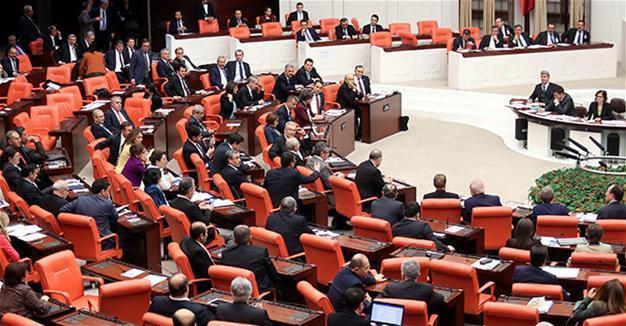Turkish Parliament approves three more articles of new constitution package
ANKARA – Anadolu Agency

DHA Photo
Turkish lawmakers late on Jan. 13 adopted the ninth and tenth articles of a new constitutional reform package that regulates criminal liabilities for the president and top officialsThe Turkish Grand National Assembly will need an absolute majority to investigate alleged crimes by the president, vice president or Cabinet. The ninth article was endorsed by 343 MPs, while the tenth was approved by 343 of 550 lawmakers.
Both articles require lawmakers to discuss the proposal within one month and a decision to launch an inquiry must be met by 330 MPs -- three-fifths of the assembly -- in a secret ballot.
An inquiry would be conducted by a commission of 15 MPs, consisting of members of the political parties in the assembly.
The commission would submit a report with the outcome of the inquiry to the presidency of the assembly within two months. If the inquiry cannot be completed within that period, a new and definite period of one month is given to the commission, articles 9 and 10 read.
An inquiry report shall be distributed to lawmakers within 10 days from the date it is given to the presidency and will be discussed in the general assembly within 10 days following its distribution.
Parliament may decide to send the president, the vice president or officials to the Supreme Criminal Tribunal with a vote by 367 MPs -- two-thirds of the assembly -- in a secret ballot.
The trial at the Supreme Criminal Tribunal shall be completed within three months. If it can not be completed within that time-frame, a three-month additional period shall be granted for one time, the article states.
The duty of those would end if he or she is condemned for a crime that prevents the individual from being elected.
Article 9 also adds that the president can not make an election decision during the inquiry process. While the tenth article says the establishment, abolition, tasks and authorities of the ministries shall be
regulated by presidential decree.
It also states that the vice president and ministers would be appointed by the president from among qualified candidates, and would be subject to removal by the president.
Once elected, the president may appoint more than one vice-president, the article adds.
In secret ballots Friday, 137 MPs rejected the ninth article while 135 opposed Article 10.
Meanwhile, lawmakers early on Jan. 14 adopted the eleventh article of the new constitutional reform package that regulates presidential and parliamentary elections.
In secret ballots early Saturday, 341 MPs voted in favor of the motion, 134 MPs rejected, while one abstained, five voted blank and two votes were invalid.
The motion changes the eleventh article of the constitution which envisages holding the presidential and parliamentary elections at the same time.
According to the motion, the term-in-office of the president and MPs will be five years and the president can be re-elected for a second mandate if parliament approves. Parliamentary decision must be met by three-fifth majority.
It was the fifth day since the debate on the constitutional reforms began in parliament. Eight more amendments proposed by the ruling Justice and Development Party (AK Parti) will be voted on.
















